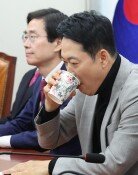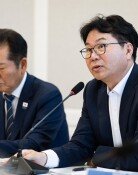Governments Pension Plan Unpopular
Governments Pension Plan Unpopular
Posted November. 17, 2006 06:55,
Public enterprises in Korea are objecting to the introduction of the national pension system in their companies, forecasting trouble ahead.
It was confirmed on November 16 that the Public Enterprise Labor Union Association, composed of 13 companies, objected to the governments policy to give additional points in its management assessments to public companies that adopt the government pension plan, rejecting the pension plan in full on October 26.
The thirteen public enterprises are KOTRA, Korea Resources Corporation, Korea Tourism Organization, Korea Land Corporation, Korea Water Resources Corporation, Korea Minting and Security Printing Corporation, Korea Highway Corporation, Korea Agro-Fisheries Trade Corporation, Korea National Housing Corporation, Korea Agricultural & Rural Infrastructure Corporation, Korea National Oil Corporation, Korea Electric Power Corporation, and the Korea Railroad Corporation.
The public enterprise labor union protested, saying, National pension plans should only be a recommendation, and decisions should be mutual agreements between employers and employees, but the government is pushing through with the plan regardless.
Having commenced last December, the national pension plan is doing poorly. As of late October this year, only 13,485 companies out of 1,300,000 signed up for the plan. Among these, most (98.4 percent) consist of companies with less than 100 employees, while only 36 companies had more than 500 companies.
The Ministry of Planning and Budget newly installed entry into the national pension plan into their public enterprise management assessment items, designed to encourage active participation for private companies. The policy will give an additional ten points to public enterprises that enter into the national pension system by the end of this year.
Kim Ju-young, head of the Korea Electric Power Corporation labor union, said, In a situation where one or two points may change the results of the management assessment, 10 points is extremely important, and added, The government is using the management assessment as a weapon to control public enterprises.
Bae Kook-hwan, head of the public innovation headquarters at the Ministry of Planning and Budget, was firm in stating the governments position to carry out the plan, saying, It is an issue that was already discussed and implemented with the input of the labor union, which is only now beginning to protest.
Depositors Not Protected-
The pension plan is a policy designed for small and medium company employees who are likely to be bereft of pensions when a company fails.
Companies manage the employee pension funds in financial institutions such as banks and insurance, and provide the pension in regular terms or in a single term.
The current pension plan will be continued until 2010, so from 2011 most companies are predicted to enter the national pension plan.
But labor unions have called for a correction of structural deficiencies.
As the national pension plan is not subject to the law protecting depositors, in the case that the financial institution managing the pension declares bankruptcy the employees may not receive their pensions.
Kim Soo-bong, chief of the pension team of the Financial Supervisory Service, said, Only financial institutions with sound finance in areas such as the equity capital rate are listed as partners, so there is no chance that the companies handling the pension funds will become bankrupt.
ssoo@donga.com ddr@donga.com







